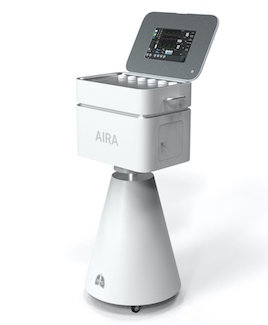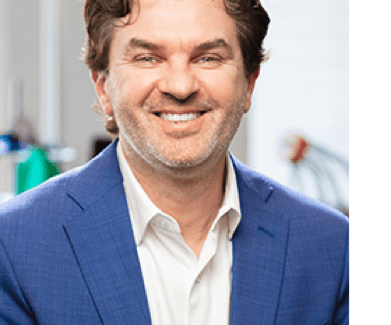Boston Engineers Develop Low-Cost ‘Robotic Lung’ – Seek Manufacturers for Mass Production
To help tackle ventilator shortages both in the U.S. and around the world, two robotics experts founded The Ventilator Project, and, with a cast of many partners – corporate manufacturing to garage innovators – they’ve built a prototype for rapid FDA approval. They hope to recruit more manufacturing partners and achieve production of 60,000 units a month by the end of summer.
Posted: April 28, 2020
Just a few weeks ago, Entrepreneur Alex Frost was looking to disrupt the floral industry, building a robotic arm to arrange roses, tulips and hyacinths.
Today, he’s trying to solve a more dire problem: how to design and rapidly mass produce an inexpensive ventilator to help ease shortages due to the global COVID-19 pandemic.
That’s the mission of Frost’s new nonprofit The Ventilator Project, which in the past three weeks has attracted hundreds of volunteers working around the clock to build a prototype that could breeze through the FDA approval process. In parallel, the group is in talks with major suppliers and manufacturers with plans to produce up to 60,000 units a month by the end of the summer.
“It feels like we are trying to build an Airbus in 30 days; something that usually takes a year, we’re trying to compress to a month,” Frost said. “It’s not something anyone would do under any other circumstances but we are cognizant that the need is immediate.”
With intensive care units and emergency departments raising alarm about shortages of ventilators to keep critically ill COVID-19 patients breathing, giant corporations and garage innovators alike are sprinting to find a solution. To help ramp up production, the U.S. Food and Drug Administration last month temporarily relaxed rules on medical device manufacturers, allowing for some modifications of materials and software, as well as quicker additions of new production lines.
Ford, General Motors, Dyson and Tesla pledged resources to make medical equipment, while engineers in Maryland have been converting unused breast pumps into breathing devices.
Hospitals in the United States have about 160,000 ventilators, according to the Center for Health Security at Johns Hopkins University. The Ventilator Project estimates that COVID-19 will cause a shortage of 600,000 ventilators in the U.S. alone—and that the global need is around 13 million units.
Rapid Prototyping for FDA Approval
Frost is anchored at the startup incubator MassRobotics, where he often brainstorms with Watertower Robotics CEO Tyler Mantel. When the pair first discussed the challenge of bringing a mechanical ventilator to market, the robotics engineers with experience in product development and prototyping quickly found themselves in familiar territory.
“It really, at the heart, is a robotic lung,” Frost said, noting that the project’s tagline is “Engineered to breathe.” “So we said, let’s see if we can actually do some good here in terms of rapidly prototyping something that we could bring to market and get FDA approval.”
Mantel decided to cofound The Ventilator Project. He and Frost reached out to their network of engineers, entrepreneurs and CEOs and, in what seems like a nanosecond, the project created many unusual partnerships that would have seemed impossible before the pandemic. The team quickly grew to more than 240 people, including top executives from the largest Fortune-100 companies who have been volunteering after work, Mantel said.
“This outpouring of support has been impressive,” he said. “Everyone’s here to solve the problem for humanity. It’s heartwarming and humbling.”
The Ventilator Project is intent on building a device specifically for COVID-19 patients that can be sold for as little as $5,000 compared with $40,000 for regular hospital equipment. To keep costs down, the team integrated supply chain and manufacturability into every level of the design process, thus reducing dependency on medical supply lines, Mantel said.
Instead, some elements of the ventilator are built with FDA-approved components that come from food and beverage and other industries that are not currently bottlenecked. For example, engineers have replaced a full regulator, which requires the federal agency’s medical certification, with a robotically controlled pinch valve.
The engineers are now putting finishing touches on a fourth prototype, called Aira, with plans to pass the FDA’s emergency approval process within two weeks. Next, the team needs to raise $2.4 million to scale from 1,000 units a month to mass producing 60,000 ventilators a month by September. The nonprofit is working to set up a rapid-response supply chain made of commercial off-the-shelf components, as well as custom parts – for which it is still seeking manufacturing support.
“Sometimes in a really fast manufacturing approach, in order to get up to speed quickly we need to go back to the basics,” Mantel said, noting that the first round of the ventilators will be assembled by hand. “As we start to scale up and get something in true mass production quantities, that’s where the smart manufacturing techniques start to come.”






